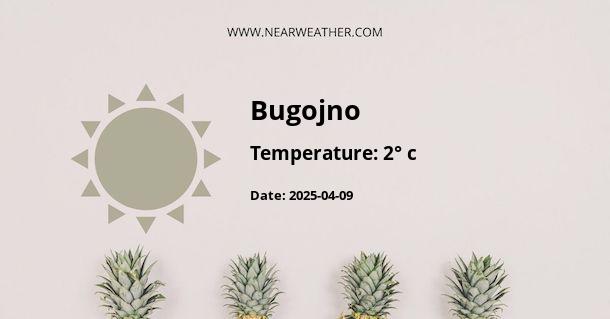Climate and Weather Overview of Bugojno, Bosnia and Herzegovina
The town of Bugojno is situated in the heart of Bosnia and Herzegovina, offering a unique climate influenced by its geographic position in the central Balkans. It experiences a mix of continental and Mediterranean climate patterns due to its altitude and proximity to the Adriatic Sea. Understanding Bugojno's climate and its weather patterns year-round requires an in-depth look at its seasonal variations, temperature fluctuations, precipitation levels, and other climatic elements.
Geographical Setting
Bugojno is nestled within the central region of Bosnia and is surrounded by the Dinaric Alps. The town lies at an elevation of approximately 570 meters above sea level, which has a significant impact on its weather conditions. This section presents the geographical context that shapes the climate of Bugojno.
Temperature and Seasonal Variations
The temperature regime in Bugojno is characterized by warm summers and cold winters. Table 1 below illustrates the average high and low temperatures Bugojno experiences throughout the year.
| Month | Average High (°C) | Average Low (°C) |
|---|---|---|
| January | 3 | -6 |
| February | 6 | -3 |
| March | 10 | 0 |
| April | 15 | 4 |
| May | 20 | 9 |
| June | 23 | 12 |
| July | 26 | 14 |
| August | 26 | 14 |
| September | 21 | 10 |
| October | 16 | 5 |
| November | 9 | 1 |
| December | 4 | -4 |
The seasonal contrasts in the town are marked, with each season bringing a distinct set of weather conditions:
- Winter: Cold temperatures with snowfall are common from December to February. This is when Bugojno turns into a picturesque winter landscape attracting winter sport enthusiasts.
- Spring: The snow begins to melt in March, signaling the arrival of spring with gradually rising temperatures and increased precipitation.
- Summer: June to August is the warmest period, with temperatures often climbing above the mid-20s Celsius. The proximity to the sea can bring some humid conditions.
- Autumn: September through November sees a steady decline in temperatures and daylight hours, with the leaves changing color and the first frosts arriving by late autumn.
Precipitation Patterns
Precipitation in Bugojno is relatively evenly distributed throughout the year, although there can be wetter and drier periods. The table below summarizes the average monthly precipitation.
| Month | Average Precipitation (mm) |
|---|---|
| January | 69 |
| February | 65 |
| March | 70 |
| April | 71 |
| May | 86 |
| June | 93 |
| July | 78 |
| August | 75 |
| September | 80 |
| October | 82 |
| November | 87 |
| December | 80 |
Rainfall can contribute to lush green landscapes, particularly in the spring and autumn when precipitation is coupled with moderate temperatures.
Wind and Sunlight Patterns
Bugojno's position in the valley, surrounded by mountains, can result in specific wind patterns. Bora winds, often dry and cool down-slope winds, can affect the area, particularly during the winter. Moreover, Bugojno enjoys a significant amount of sunlight, especially during the summer months. However, due to its geographic position, daylight hours can be significantly shorter during the winter months.
"Bugojno's diverse climate provides opportunities for a wide range of outdoor activities. From skiing in the picturesque mountains during the winter, to enjoying the lush greenery and outdoor markets in the summer, the weather shapes the cultural and recreational life of its residents." – Local Climatology Expert
Extreme Weather and Climate Events
Like many areas with continental climates, Bugojno can occasionally experience extreme weather events:
- Heavy snowfalls and cold snaps in winter can lead to transportation disruptions and increased heating demands.
- Thunderstorms are possible in the summer, sometimes accompanied by heavy rainfall and hail.
- Flood risks, although not frequent, could be an issue during periods of heavy and persistent rainfall, especially in areas surrounding rivers and streams.
Climate Change Considerations
Climate change presents future uncertainties for Bugojno's weather patterns. Rising global temperatures could lead to:
- Warmer overall temperatures, possibly leading to hotter summers and milder winters.
- Changed precipitation patterns, with consequences for agriculture and water management.
- Increase in the frequency and intensity of extreme weather events.
The accurate modeling and prediction of these changes are essential for developing resilience and adaptation strategies in the region.
Year-round Weather for Travelers and Residents
For travelers planning to visit Bugojno, or for new residents trying to understand what to expect of the climate, summarizing the town's year-round weather provides invaluable insights:
- Best Time to Visit: Late spring to early autumn offers the most pleasant temperatures and ample outdoor opportunities.
- Winter Activities: Skiing and winter sports are best from December to February when the snow is abundant.
- Sunniest Months: Enjoy the most daily sunshine from June to August.
- Wet Seasons: Take note of the increased rainfall in May and October, which can impact hiking and other outdoor activities.
In conclusion, Bugojno exhibits a climate that is both versatile and dynamic, offering residents and visitors a truly seasonal experience. From its crisp winter days to its warm, verdant summers, there is a distinct charm in every month of the year. Whether engaging in winter sports or exploring the region's natural beauty in the warmer months, being prepared for Bugojno's climate ensures a rewarding time in this central Bosnian locale.
A - Bugojno's Latitude is 44.057220 & Longitude is 17.450830.
A - Weather in Bugojno is 7° today.
A - Climate Conditions in Bugojno shows overcast clouds today.
A - Humidity in Bugojno is 91% today.
A - Wind speed in Bugojno is 8.53 km/h, flowing at 173° wind direction. today.
